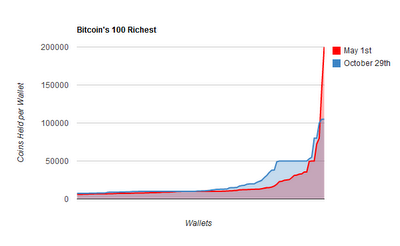The owner of the Bitcoinica site has released some data from his site which may reflect the wider bitcoin economy. He gives a value for the Gini coefficient of:
Gini Coefficient = 0.87709
The Bitcoin Report site also releases a regular report on the number of bitcoins in the top 100 wallets. Although one person can own multiple wallets or a wallet of a exchange (e.g. MtGox) may contain coins with multiple owners so it is impossible to know for certain the real wealth distribution but it may have some correlation.
The Bitcoin Trader blog used the Bitcoin report data on the top 100 wallets and compared the data from May 1st and Oct. 29th 2011.
 .
.
From the Bitcoin Trader:
The distribution of coins among the top 100 has evened out, as can be seen in the chart.
Even though 1,310,000 Bitcoins have been mined since May 1st, the top 100 have still managed to increase their relative wealth, and now hold 29.8% of all the Bitcoins ever created!
While certainly not perfect these type of statistics may be give some indication of the trends in the wealth distribution in the bitcoin economy.

 .
.